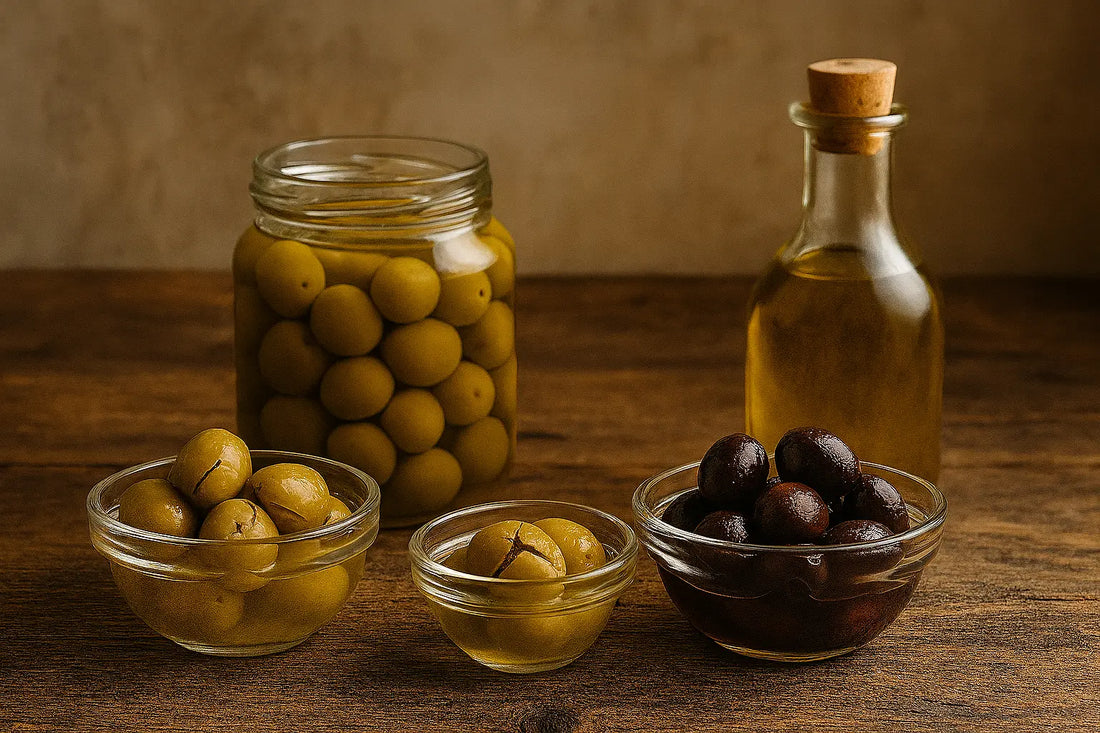Are Pickled Olives Healthy? Benefits You Should Know

Pickled olives have long been a staple in Mediterranean and Middle Eastern diets—not just for their bold, salty flavor, but for their deep cultural significance and surprising health benefits. From breakfast tables to mezze platters, these preserved gems add a burst of flavor to any meal.
But are pickled olives actually good for you? The short answer is yes—with a few things to keep in mind. In this post, we’ll explore the nutritional value of pickled olives, the difference between green and black varieties, and how to enjoy them as part of a balanced, flavorful lifestyle.
What Are Pickled Olives?
Pickled olives are simply olives that have been cured and preserved in saltwater (brine), oil, or a mixture of herbs and vinegar. This process removes the natural bitterness of fresh olives and makes them safe and delicious to eat.
In Palestine, olives are more than just a food—they're a way of life. Traditional varieties like cracked green olives in brine and black pickled olives are made using age-old techniques, often passed down through generations.
You can browse our full collection of Palestinian olives, including green baladi olives and more, right here:
👉 Watany’s Olive Collection
Health Benefits of Pickled Olives
So, what makes pickled olives a healthy choice? Let’s look at what they offer:
1.Rich in Heart-Healthy Fats
Olives are naturally high in monounsaturated fats, especially oleic acid. These are the same “good fats” found in extra virgin olive oil that support heart health by helping to reduce bad cholesterol (LDL) while maintaining good cholesterol (HDL).
Even when pickled, these beneficial fats remain intact—meaning olives can contribute to a heart-healthy diet when eaten in moderation.
2.High in Antioxidants
Both green and black olives contain powerful antioxidants, such as vitamin E and polyphenols. These compounds help protect your cells from damage caused by free radicals and may support reduced inflammation over time.
Antioxidants are especially concentrated in traditionally cured olives, such as the Baladi green olives from Palestine, which are preserved naturally with minimal processing.
3.A Source of Fiber
Pickled olives contain dietary fiber, which helps with digestion and contributes to gut health. While they aren’t a major source of fiber, adding a few to your meal can help boost overall intake and support regularity.
4.Mineral-Rich
Olives contain a good amount of iron, copper, and calcium, which are essential minerals for red blood cell function, bone strength, and overall energy levels.
While the sodium content is higher in pickled versions, this can be balanced with hydration and moderation in other salty foods.
Green vs.Black Pickled Olives
Both green and black olives are harvested from the same tree—the difference comes from when they are picked and how they are cured.
- Cracked green olives in brine are picked early while still firm and bright in color. The cracking allows brine and spices to penetrate deeply, giving them a bold, punchy flavor. These are perfect for sandwiches, salads, or simply as part of a mezze tray.
-
Pickled black olives are usually riper, softer, and richer in flavor. They tend to be less bitter and are great in warm dishes like stews, roasted meats, or alongside bread and cheese.
Each variety has its own personality—try them both and see what fits your taste.
Are There Any Downsides?
As with many pickled or brined foods, sodium is something to be mindful of. Most pickled olives are high in salt because salt plays a key role in preservation and flavor. If you're watching your salt intake for medical reasons, it's best to enjoy olives in small amounts.
You can also rinse pickled olives briefly under water before serving to reduce excess salt without losing all their flavor.
How to Eat Pickled Olives
There are endless ways to enjoy pickled olives, especially when you’re using traditional varieties:
- Add to breakfast with flatbread, labneh, and cucumbers
- Toss into grain salads for a salty, satisfying bite
- Chop and mix into tomato sauces or pasta
- Serve with cheese, nuts, and dried fruits on a mezze board
-
Eat them straight from the jar—we won’t judge
To complete the experience, serve them in a traditional Palestinian ceramic bowl and pair with a drizzle of quality olive oil.
Final Thoughts: More Than a Snack
Pickled olives are more than just a condiment—they're a flavorful, nutritious part of Palestinian heritage. Whether you're reaching for green Baladi olives, cracked olives in brine, or rich pickled black olives, you're tasting a food that has fed generations and brought people together.
Add a few to your plate, and you’ll not only boost your meal’s flavor—you’ll also tap into something timeless and nourishing.
Explore the full range of our olives and taste the story behind them at
👉 Watany Palestinian Products
